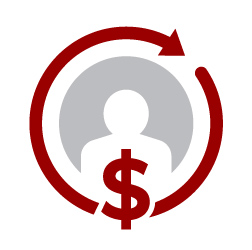Hiring the right salesperson can feel like finding a needle in a haystack. It’s a delicate balance of skill, experience, and the elusive ‘fit’ for your company culture. Get it right, and you unlock a treasure trove of revenue and growth. Get it wrong, and you’re left with the costly aftermath of a hiring disaster.
We’ll explore why high-performing salespeople are essential to the success of your business and share common pitfalls in the sales hiring process. From revealing the hidden costs of an average sales representative to understanding the nuances of a well-matched sales fit, we’ll arm you with the knowledge to build a formidable sales force that drives your business forward.
The Competitive Advantage of a Good Sales Hire
Salespeople play a crucial role in the success of any business. As Henry Ford famously said, "Nothing happens until someone sells something." While it’s understandable that many steps need to be taken before a product or service can be sold, Ford's point remains valid—sales are necessary for companies to generate revenue and keep the lights on.
According to a survey conducted by RAIN Group:

62% of B2B buyers consult sales representatives to help them problem-solve and fix issues.
It makes sense when you think about it. The likelihood of a business committing substantial amounts of money without ever consulting a live sales rep is nearly zero. Salespeople play a critical role in adding value and streamlining the buying journey at every stage. While a robust marketing strategy may generate plenty of leads, the effort may prove futile without capable salespeople to convert leads into scheduled meetings and product demonstrations.
Data shows that high-performing salespeople matter more than you may think. The contrast between top-performing sales representatives and their less successful counterparts is stark. McKinsey & Company has studied this very idea.

The top 30% of sales reps outperform the bottom 30% by 4x.
*According to research by Mckinsey & Company
The Cost of a Bad Sales Rep
A bad hire on your sales team isn’t just a setback—it’s a significant financial drain. The stakes? On average, anywhere from $381,000 to $1 million per bad hire. So, just as a high-performing salesperson can be one of your greatest assets, a bad sales rep can potentially be a disastrous liability.
But what about reps who fly just under the radar? Mediocre sales reps may do just enough to get by, but their consistent underperformance can make life difficult for everyone else. When this happens, your team’s culture can also suffer. High performers want to be part of an organization that thrives, not in a place where they must compensate for consistent losses.

Organizations spend $37 billion annually retaining unproductive employees.
*According to research by UrbanBound
It’s common knowledge that typically, 20% of salespeople generate a whopping 80% of total revenue — a phenomenon known as the 80/20 rule. But what if you could shift this dynamic, boosting your ratio by just 10%? The implications for your business could be substantial. Focusing on optimizing sales productivity isn’t just a goal; it’s an imperative for any forward-thinking company.
How to Avoid a Sales Hiring Disaster
So how do you actually hire and develop sales superstars? The answer boils down to a concept called job fit. It’s the key to selecting candidates whose individual traits and characteristics predispose them to success in a sales role. A job fit assessment, like PXT Select®, can help you avoid sales hiring disasters and find sales reps who will be high performers.
Job fit strategically aligns a candidate’s traits and motivations with job requirements, transcending a mere checklist to match individual potential with company goals. It’s not just about filling roles—it’s about placing individuals in jobs where they can realize and maximize their full potential. More specifically, the job fit approach looks at candidates’ preferences and tendencies to determine:
- If they can do the job
- How well they’ll do the job
- Whether they’ll enjoy the job
These factors collectively determine whether a person can succeed in a specific role, and it is essential to ensure that each new hire is not only competent but also compatible and likely to thrive. Without these qualities, it is unlikely that the person will experience long-term success.
Research by Harvard Business Review has shown that most organizational turnover is caused by hiring individuals who are not a good fit for their roles. In sales organizations, high turnover rates can have significant financial implications.

Forbes reports that an increase of just 5% in sales rep turnover can increase the total cost of sales by 4% to 6%.
*According to research by Forbes
To learn more about avoiding sales hiring disasters with data-informed hiring insights, download our eBook, Building High-Performance Sales Teams For Dummies, PXT Select Special Edition. It's your road map for creating the kind of sales team your business needs to succeed, helping you both hire and develop your sales dream team.